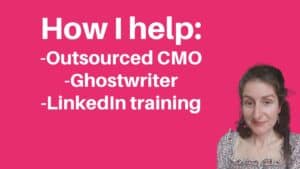Podcast: Play in new window | Download
If you are thinking about becoming an Edward Jones financial advisor, STOP and read this blog ASAP! This is the true story of Nathan Penha, a former financial advisor with Edward Jones – you’ll hear the real story about what it’s like from someone who spent six years there.
This blog/podcast talks about, from Nathan’s perspective:
- What was it like being an Edward Jones financial advisor?
- What were you surprised to find out once you got started?
- Why do so many EJ reps fail?
- What are some marketing tips you’d give to Edward Jones advisors?
For those of you who are new to my blog, my name is Sara. I am a CFA® charterholder and financial advisor marketing consultant. I have a newsletter in which I talk about financial advisor lead generation topics which is best described as “fun and irreverent.” So please subscribe!

Is being an Edward Jones financial advisor REALLY what they say it is?
In this podcast (linked at the top of the page), I interviewed Nathan Penha, a former Edward Jones financial advisor, to get an insider’s view on what it’s like going through the Edward Jones training program and working at the company. Nathan started at Edward Jones out of college and stayed for about six years.
Before we start, please keep in mind that everyone’s experiences are different, and this can by no means represent what the case may be for any other person. This merely an accounting of the experience that one Edward Jones financial advisor had.
Here were the key things that I learned.
#1 The starting salary is a major perk
Nathan entered the Edward Jones financial advisor training program right out of school. It was a major advantage that they paid a base salary; albeit not a huge one it was still supportive of him feeling a bit more comfortable that working on straight commission.
Going on straight commission is definitely a pressure-cooker and I would encourage anyone looking to start out as a financial advisor to consider programs like this that do not try to make you starve in order to motivate you to develop business. This often creates perverse outcomes that are not in the client’s interests, because the advisor may apply pressure sales tactics.
There were other benefits as well. Nate said that the Edward Jones name was also a factor, by the way. He felt it would help his credibility to have a strong name behind him. He also got support when he was studying for his Series 7 exam, and he had a few mentors from the company.
#2 Safety is sometimes an issue for Edward Jones reps
As Edward Jones reps are required to meet a quota for human interaction on a daily basis, often Nathan would go door-to-door to look for new clients. He said that it actually worked pretty well, because just by the sheer number of people he was talking to on a weekly basis, there was enough lead activity that came out of it.
Nathan is a person of color, and his territory was moved to a rural part of Central Florida. It was a difficult situation and there were many instances of his safety being compromised.
According to Nathan:
- Somebody chased him out of the neighborhood with a weed wacker
- Somebody called the police on him for no reason other than him just being present in the area
- He had a gun pulled on him numerous times
Terrifying.
It’s likely that other Edward Jones financial advisors have experienced this, as many of them go door-to-door and get invited inside people’s houses to have the opportunity to talk about what they do. Nate says he was given no real safety training and just told “use your best judgement.”
Safety is a concern for anyone who visits private homes alone, and it is especially a concern for women who may be the targets of sexual crimes. I would suggest that Edward Jones reps aspiring to call in person and venture forth inside strangers’ homes pursue safety training, either independently or to request it from the company.
#3 Best to use a humble approach
Nate would go door to door, at first, when he was prospecting for wealth management clients. His personality is a bit more relatable and laid back, so he didn’t use a high pressure sales pitch. Instead he just said something like: “My name is Nate, I have a local business helping people with their finances. Is this something you’d be interested in talking about?”
Bravo.
Short and to the point, with a question at the end. Nate, you make my Two Sentence Rule proud.
#4 Assimilate the Edward Jones financial advisor sales training to your own style
Nate said that although the Edward Jones sales training program was great, he got the best results by taking their teachings and adapting it to his personality. This is a great tip and it applies to any type of sales training.
Scripted sales pitches aren’t great because inevitably you wind up sounding like a robot. Use the principles and put them into your own words.
Sara’s upshot on being an Edward Jones financial advisor
What’d ya think of my blog on Edward Jones financial advisors? Was this helpful?
If yes…

- I am an outsourced CMO for companies who need regular, full service marketing – blogging, social media posts, newsletters, etc.
- I am an hourly consultant for those who just need one-time or recurring guidance
- People hire me as a ghostwriter to write content for a project fee
- I have a social media training program
- I have a book about what to say on LinkedIn messenger
Just letting ya know, in case you need me at some point.
Thanks for reading. I hope you’ll at least join my newsletter about financial advisor lead generation.
Join the Transparent Advisor Movement. Learn more about it in this video:
See you in the next one!
-Sara G
Podcast transcript
0:00:00.3 SARA GRILLO, CFA: What is working at Edward Jones really like… Hold on a second, because we’re gonna talk about it with a part of people… It’s me, Sarah G with the snack and I’m back. I am a CFA charter holder, and I used to be a financial advisor. On this podcast, I provide non-BS-oriented straight-up views on LinkedIn and other financial advisor marketing topics, you can’t get this anywhere else, people… So if that’s what value, then please subscribe, and if not, then please leave this podcast right now. Okay, everybody. So Nathan pay is a retirement plan consultant, and he’s here today to talk about the experience of being an Edward Jones financial advisor. A, welcome to the show.
0:00:56.1 NATE PENHA: Hey, Sarah, thanks for having me.
0:00:59.2 SARA GRILLO, CFA: Let’s just start off, how did you… So right now, you are not currently with Edward Jones, correct? Correct. Yep. Okay, how did you wind up being an Edward Jones financial advisor? At whatever point in the past you were… Tell me
0:01:15.9 NATE PENHA: This. Yeah, so I graduated in 2011, so we were still only a year or so a lot of the recession at that time, and it was tough to get a job as a recent college grad, and I was watching out where I actually had the offer from everyone about two or three months before I graduated, there wasn’t Everton advisor who actually was hoping to do some kind of seminar at the school my mom works at, and the two of them were talking and she was like, My son is sort… Find graduating soon. Can I introduce you? Or can I have it reach out? And it kinda started from there, so he really kinda got the ball rolling for me and… So that was back in 2011.
0:01:59.2 SARA GRILLO, CFA: Okay, so a, what was your original motivation for taking the offer then…
0:02:06.6 NATE PENHA: The name was strong as a college grad, that young… You wanna manage money, you need a strong name behind you, they also offered a salary, it wasn’t a lot, but still it was a salary and offered compensation while I was studying for the Series 7 and 66 where… None of the other offers that I had offered that as well.
0:02:28.2 SARA GRILLO, CFA: Alright, so you’re sitting here saying, Okay, you know this was your undergraduate that you’re graduating from, or you’re saying you’re saying, Okay, well, I could go work for an insurance company and be broke while I’m getting my licenses and ramping up and be hustling every day for a 2000 commission for selling a 20-year life policy term policy, or I could go and be kind of maybe supported a little bit more in the beginning, so that was attractive to the salary. Absolutely. Okay, were there any other benefits? And the reason that I’m going into this is that I want people to understand what it’s advertised as is what it eventually ends up being and the different angles on that, so… What else were you thinking at that point? I was at the training that you thought would be great where they say they were gonna give you a mentor… So
0:03:26.6 NATE PENHA: My path was a little bit different than what is traditional, and then also it has changed substantially since then, so when I started, I did… I went into an advisor training program in the corporate office in St. Louis, so I had two months to study for my 7 and 66, and then moved to St. Louis did that advisor training program, but during the time well, study and they did offer a long support, I think there was a weekly call we had with our trainer who would help with any study-related questions while going through the 70 and 66. And there was also monitoring progress, so every time you did a chapter exam, they would be monitoring how you scored on that exam because there was a correlation and how you did on the practice exam and what that would look like on the actual exam. So there are certain benchmarks you have to hit basically in order to keep going, and then once you got through that training, again, the same thing, you always had someone overseeing your development, someone overseeing the training, people you could reach out to. And then eventually, when you get into the field, you’re assigned a mentor, but you could always go out and find somebody, yourself, someone that you mesh with and have them help you out, teach or the things that you weren’t taught before the actual day-to-day, real life stuff on how to manage a book of business and how to prospect for a book of business and so long.
0:04:52.2 SARA GRILLO, CFA: Okay, so it sounds like it was a relatively kind of nurturing process…
0:04:59.6 NATE PENHA: Oh yeah. Yeah, a lot of hand-holding. Which is good.
0:05:03.7 SARA GRILLO, CFA: And so what was it like when you first started out in that process, was it… Were you feeling good about the job… Did you feel like you were getting somewhere? What was it like initially? Being an Edward Jones financial advisor.
0:05:20.4 NATE PENHA: A man from St. Louis, they moved me to a rural part of Central Florida, that was tough, but there was a lot of support, but at that point, you’re kind of more or less on heroine, you have to go out and find the people, you gotta go and find prospects and start building that prospect list. There is support, but again, you’re kinda left on our… Like I said, you have that salary to help out because that first year is brutal, it’s pretty tough, but that support doesn’t go away, it just shifts a lot during that first year. Again, this was back over a decade ago then, it has changed as far as I know, but
0:06:10.6 SARA GRILLO, CFA: No, you were just sitting there one day, or you were just doing your work one day, and you get a call from the home office, it says, So you’re gonna be shipped out to send for Florida. Now that happened.
0:06:25.0 NATE PENHA: Kind of I told him I wanted to… So I’m originally from the rest, I said I wanted to be in Florida at the cold, warm weather, so… Alright. So if something opens up in Florida, we’ll let you know. And that’s kind of what it was, and I think they gave me one week’s heads up and said, Hey, there’s an office open, this is your one shot basically to go check it out and see if you wanna move there, if not, then I don’t know what to tell you… So it’s kind of like you gotta go… You don’t really have the option to be like, Oh, I want something better. And so I went out, got to Centralia, a town called Ocala, and yes, and then I think maybe a month later I was there. Starting fresh rule not a good fit at all for a lot of reasons, but… Yes.
0:07:18.3 SARA GRILLO, CFA: Okay, so what happens next?
0:07:24.1 NATE PENHA: You’re an advisor. You’re a full-fledged advisor. I had a book that I took over as a very small book, but go out and prospect Banister to build it, do as much as you can and hit you hit your numbers. So hold on.
0:07:40.7 SARA GRILLO, CFA: So they gave you a book of business…
0:07:43.6 NATE PENHA: Yeah, it was a 5 million book. I was like the fifth advisor in four years that was in that office, so it was not good, really, but I focus more so on just on building the book rather than what was there, was managing what was there, but I really needed to focus on building it rather, ’cause you can’t live off a 5 million… 81. No.
0:08:08.6 SARA GRILLO, CFA: Okay, so why do you think so many Edward Jones reps don’t make it?
0:08:23.0 NATE PENHA: Two reasons, I guess. So when I was there, I wanna say the attrition rate was like 80% in your first year, give or take, it could have been higher. Really, when I first started, those that failed ’cause they just didn’t do the work, for most people that didn’t go my route, they went more of the traditional, Hey, you gotta study and start prospecting, overtimes gave him two months of nothing else to do other than prospect you’re done studying, you don’t have to worry about exams, you just got a prospect preferably six days a week, just prospect, build up that list, and then once you have your cannabis date, I guess is what it’s called now, then you can start calling on them, trying to convert them into clients. So most of the time you just don’t do the work, it is really what it happens to be, and a lot of times as you might hit it off with one or two or three good prospects, ’cause the goal… Yeah, first year is really very attainable. If you’re doing the work, you might find a couple of prospects that really make that year for you and you kinda take your foot off the gas and you slow down, and then by the time you ramp up, you’re already way too behind, but now, from the time that I left, I left in 2017.
0:09:37.9 NATE PENHA: Most of the advisors were just given 20, 30, 40 million of am, most of it feared, and they don’t do the work because eventually it does catch up to you as well. So
0:09:49.0 SARA GRILLO, CFA: When you say Not doing the work, do you mean… I mean, there’s a daily quota from what I understand, that boons financial advisors have to be… In terms of making contact?
0:10:02.3 NATE PENHA: Yeah, prospecting… Managing the existing book. Obviously, you can never stop prospecting, it just shifts as your practice grows and involves, but you don’t ever stop prospecting, those that stop prospecting, they feel it really fast and to the point where by the time they realize it is there are already two or three months behind where they should be, and it’s difficult to catch up from that point, that point on, because the numbers start to really ramp up the longer you’re there. What was it like
0:10:38.0 SARA GRILLO, CFA: Having the experience of having to go out and prospect every single day.
0:10:44.9 NATE PENHA: Rude… Especially in Florida, so I ever… Challenge when I started was you gotta go out and knock on people’s doors and get them to talk about their savings, so it was quite difficult and I… Weirdly it works. I was able to get a lot of really good clients knocking on their door, talking about money, now I know because of covid, I think they’ve shifted more towards traditional networking processes or styles, but going out, building that community relationship, I guess, with the local area that you’re in, it’s not fun in the Florida summer, where it’s 90 plus degrees with 00% humidity. So sometimes people just take pity on you and they’ll continue talking to you, and eventually he give you a minor conditioning. Right.
0:11:39.3 SARA GRILLO, CFA: What was it like having to go into somebody’s house that you didn’t know… Me, weren’t you a little bit scared?
0:11:52.5 NATE PENHA: Absolutely, absolutely. I did have a couple of people pollute, which was not fun. Again, you’re in rowhouses.
0:12:01.5 SARA GRILLO, CFA: Are you kidding me? Are you a ton?
0:12:04.4 NATE PENHA: Now, I’m denser, so it happens, it happens quite often where someone has either it’s maybe not trained on you, but their hand is on a weapon, it happens a lot with a lot of advisors.
0:12:18.2 SARA GRILLO, CFA: Okay, no, that’s important, because you know what, one day I posted something to my social media about how I had just had a baby, and I knew this woman from the playground, and I was talking to her once, and I’m like, Oh yeah, I work in insurance, and she’s like, Oh, I need to talk about that. You should come some time, and so I went, I had this newborn baby and I’m sitting there and I’m talking to her and I’m like, So what are your plans for like… You know, if something will happen to you, and she’s like, Well, I just rely on my parents, and I’m like really like… But have you discussed this with them? And all of a sudden she goes nuts, literally flips, goes nuts, and it’s like, I don’t know, this is none of your business, I don’t know where you’re given… And I’m like, Oh, I’m sitting there. I had just had my second child. I have four kids, I just have my second baby, and I was there with actually my first child too, ’cause she had a child about my first baby’s age, and so I’m like, just making excuse, like I cut the meeting short and I just got out of there but I was like, Whoa, and then post it to this about this on social media, not even thinking anybody would have anything to say, and then I was so astounded when so many people posted back with a similar story.
0:13:34.4 SARA GRILLO, CFA: There were numerous people. Okay, so how does that happen that you go in their house and you’re sitting there talking and you’re just like, How do you… First of all, how do you start the conversation about money?
0:13:49.7 NATE PENHA: I’m not in your face sales kind of person, I’m more that relationship. Really driven sales guy. So my spiel, if I remember right, I was like, I got a local business. Here’s what I do, if you wanna have a chat. Let’s have a chat. Not a big deal. And then I think that kinda helped ease the tension a little bit, I’m like, Hey, no, what… I’m not trying to tell you to try 00 bond right now. And I think that helped her were a lot of people who invited me into their house, sat down on the kitchen table, we had water, tea, whatever, and we just chatted about stuff, and eventually the conversation led to money or about why I do what I do, or what their particular situation is, there’s not a lot of people who are open or comfortable talking about their finances to strangers, even to their family, but you will find surprisingly knocking on a random person’s door talking about asking them to talk about money, you will find a staggering number of people who are completely comfortable and open talking about their situation and what their portfolio is doing and how often they meet with their advisor and all this, and it’s a…
0:14:59.2 NATE PENHA: Souter
0:15:00.4 SARA GRILLO, CFA: Those things happen though, when you would go in there and someone would pull a gun on… Did anybody ever Brandis a weapon on you?
0:15:08.3 NATE PENHA: Yes, yes, actually. Yeah, so in rural Florida, it’s difficult to be a man of color walking around knocking on random people’s homes.
0:15:21.7 SARA GRILLO, CFA: So I think that’s your ethnicity.
0:15:26.1 NATE PENHA: I’m Portuguese, but I’m like, I have dark skin tone, so my family is predominantly from Africa, so there was one instance where I was actually chased out of the neighborhood because someone was coming at me with a weed wacker, literally walking behind me, rubbing the thing up, and he just kept walking faster and faster behind me, and I was like, Alright, this is not okay. Yeah, so that happened, someone did reach for a gun one time when I was talking to them, there were people who would lock their doors when they see me come, it’s a thing, and it’s sad, but it happens where other advisors… Maybe not to that extent, when I will come back and move the weapon, because people think they’re trying to… Now, I’m gonna take one step back. I have had the police call on me because I fit a description, that’s it, nothing more. But I actually ended up trying to the officer into a prospect, which was… That’s a good conversation also. Oh my goodness. Yeah, yeah, it was tough. So I stopped knocking on doors.
0:16:43.7 SARA GRILLO, CFA: Man, I’m so sorry. These injustices, they’re not just what people blog about or that you read about in the news articles, for everyone listening to this, please understand that the reality of being a person who looks a certain way in America and everywhere across the world is… I mean, it’s an adversity, it can be such an adversity, and so when people say these things about diversity and inclusion, they’re not just making it up, it comes from experiences like this… Me, I’m so sorry. Maybe there could have been better preparation for this, maybe that territory wasn’t the best place. Was there any safety training?
0:17:34.2 NATE PENHA: No, no. So what frustrated me more so than that, was when I had a conversation with one of the partners, and he was the one to kind of… Tried to get me in to that part of Florida. When I had the conversation with him, a year and a half of being there, he told me, I didn’t think it was gonna be a good fit for you there, but I know you… You would do well. You can’t, come on, man, you can’t tell me that the exact reds that I’m telling you I need to get out of there is why you didn’t think it would be good… That’s a problem. But nothing was done until I voice that frustration and an email to compliance or to HR, I forgot who it was, did anything actually get done, ’cause from that conversation with that partner until the time I re-located to my practice to Tampa, I think it was probably about six months or so. Too long. Yeah, way too long. Way too low.
0:18:37.9 SARA GRILLO, CFA: This situation was kind of set up for failure, not that you failed, but it sounds like you… Odds were stacked against you.
0:18:46.8 NATE PENHA: Very much so. I’m not… So some of the mentors I had were, ironically, was not set out this way, there were other people of color, they were Hispanic advisors, there were a handful of non-Caucasian advisors, and they had my back when… I don’t talk about this that often, I have more so now, ’cause it’s just… It happened so long ago, and I think it’s something that people need to know. But then it was difficult to me to share that with anybody, but to know that… Why was it difficult? I didn’t want it to be seen as an excuse as to why I had a tough month or tough couple of weeks, whatever, I didn’t want that to be seen as a hindrance as well, he’s not doing well. Why, I don’t want that to be like, Well, that’s just an excuse. You could just go to another neighborhood, which I actually was told… Well, just don’t go back there. Go to some place else. So I kinda kept it on the raps for a very long time and only told us it, few people…
0:19:59.1 SARA GRILLO, CFA: It’s not that it’s easy in the first place to go out there and knock on doors when I was younger, in my 20s, and maybe even in my 30s, I had this job cold calling, I never had to knock on doors, but it was soul killing it off just to go out and every single day… I mean, I can’t even believe it. When I look back, I don’t know if you can empathize with this at all, but I can’t even believe looking back that there were times in my life where every single day I went into work and was on the phone for eight hours a day, making cold calls, but I can’t even believe I mentally how I got through that. You know what I mean? So it’s like it’s a mental challenge in the first place, and then on top of it, because you’re a person of color, you have people that just naturally are gonna be skeptical, I think it’s such a testament to your skill and your tenacity that you are able to get as far as you did, because a lot of people would have found those challenges insurmountable, and then also just now I’m just in my mind is racing here, hearing things and I’m thinking about why there isn’t more safety training for people who are going to…
0:21:21.2 SARA GRILLO, CFA: Or door, going in people’s homes, when you think about… I mean, myself as a woman, right, I went into this other woman’s house and I had two kids with me, but just also being a woman, not that men aren’t taken advantage of or raped or assaulted, but it is common with women to be the victims of sexual assault. I’m surprised that there isn’t more safety training or more of an open forum for discussing these kinds of fears, ’cause I can’t imagine anybody male, female, whatever, race, whatever, height, whatever, build and anybody… I can’t imagine anybody not having safety concerns when they’re in this kind of a situation…
0:22:04.9 NATE PENHA: Yeah, if I remember correctly, I think it was just used your best judgment was the safety training. I can’t remember there being an hour-long tutorial or days-long conversation on how to keep yourself safe when doing this, everyone had something different, and I never had a conversation with any female colleagues about what they did or what they went through, ’cause no one ever talked about any kind of adverse conversations, it was usually, Oh yeah, that old guy answered the door and his boxers, that was kind of like the extent of it, but they would say.
0:22:43.4 SARA GRILLO, CFA: But you’re not telling… Very possible, very possible. What’s more likely is that women that go into these kinds of situations maybe just get kind of have comments thrown at them, or situation… You know what I mean? Or informations towards like So you single that kind of thing. I can, I would imagine that more so, but it’s not to say that they are outright a soft… Who knows, right? Mansour best judgement, it’s like, oh great, so what do I do when he’s got me in a choke hold or when he’s got both my hands in his hand and he’s like, Okay, well, anyway, so what do you think was the marketing strategy that you feel works the best for you as an Edward Jones advisor when you were out there, what… I know they probably have tons of training, but… What worked for you?
0:23:44.1 NATE PENHA: So the document does did work, and then once I got away from it, I was able to get my practice big enough or I’m not necessarily, but to the point where I didn’t have to do that anymore, and I could shift my focus to more referral-based at networking-based prospecting, and that’s what I did, that really worked for me and helped honour my practice around and send her… I didn’t have to worry about just asset management or bringing in assets, I could focus on what I wanted, which was more comprehensive planning, so I worked with a state attorney, I worked in the cpas, I work with other professionals on having that open relationship with them where you have a client, please remember to make me part of your value proposition, because that’s what I’m going to do. When I have that conversation about estate planning, I’m talking about my specific estate planning attorney that I partner with, I don’t talk about what I do, I talk about the attorney that I work with, and then when I moved to Tampa, I immediately started joining civic organizations, and set on some boards and did a lot of community stuff where I got my name out there, and I worked very hard to make sure I had a positive reputation, and it did work because when I would go and introduce myself to somebody, a lot of times they’re like, Oh yeah, I heard about you so and so, I was talking to me about you, and they said, We need to connect a Baba.
0:25:07.7 NATE PENHA: It worked and it was really good, and I didn’t have to worry so much about bringing in every single dollar, turning that into a commission so I could… So I could eat. I knew that it was… I got it to the point where it was nice and consistent on a turn key, basically, I guess it was the only term that I can think of…
0:25:35.3 SARA GRILLO, CFA: So what would you say didn’t work.
0:25:41.9 NATE PENHA: In terms of marketing?
0:25:43.5 SARA GRILLO, CFA: Yeah, what if you were to talk to… ’cause people listen to this that are going into the program or looking to be an Edward Jones financial advisor, or curious that will be coming. And Edward Jones financial advisor, what would you say to them? Don’t do this.
0:26:00.8 NATE PENHA: Don’t follow what somebody tells you worked for them word for word, it worked for them doesn’t necessarily mean it’s gonna work for you, and if you spend copious amounts of time on trying to do that one particular strategy that work for another advisor, you could fall behind, because you realize two, three weeks later, this thing doesn’t work, you just got a formal works with your skill set and your personality, your strengths, and do that take bits and pieces of what people tell you, make it your own, and then go from there. Yeah, I tried that, I try doing what all this advisor did that and I see where they’re at, I should be doing that too, and then I’m banging my head against the wall using this working, I’m using the exact verbiage that they use doesn’t work.
0:26:47.9 SARA GRILLO, CFA: Once I have the sales training program where they… I went to the sales seminar, I was the small three-day workshop, and this one sales trainer made us memorize the script, and every time I’ve had to memorize a script, it never works, ’cause I never quite feel like… And then we had to recite it exactly from memory, and it was this Mariota, I don’t believe in scripted speech, because I do think you should go in there and have an idea of the concepts you want to bring out and the questions you wanna ask, but just in general, it’s always better to go with what flexes to your personality.
0:27:36.8 NATE PENHA: Yeah, well, it’s that point, that script was someone else’s words, that was what worked for them, you can’t train a bunch of people to use your words that worked for you, obviously, spacial calling in New York City is gonna be different than cold calling in Peoria, Illinois, it’s not gonna be the same, you gotta use different words, a different tone, a different pace of speech and so on.
0:28:03.1 SARA GRILLO, CFA: Yeah. Alright, great, well, thank you so much for being here with us. And everybody, I hope that you’ve enjoyed our interview on the experience of being an Edward Jones financial advisor, everybody, please subscribe, rate and review this show.
Disclosures
Music is Nice to You by the Vibe Tracks
Podcast transcription is altered from original recording





